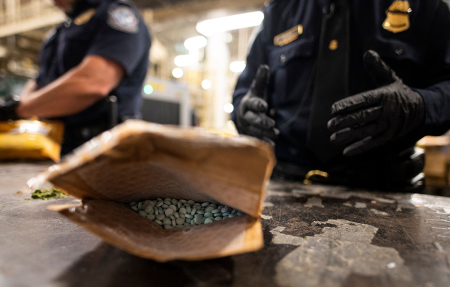White House hails record decline in drug overdose deaths

The White House is celebrating what it calls “the largest recorded reduction in overdose deaths” as the number of people dying from drug overdose fell by 12.7% in the 12-month period ending in May.
Drug overdose deaths highlighted in preliminary data released last Wednesday by the Centers for Disease Control and Prevention saw a decrease in 41 states. White House Office of National Drug Control Policy Director Dr. Rahul Gupta said in a statement that the Biden-Harris administration took aggressive steps to reduce drug overdose deaths when they took office.
“When President Biden and Vice President Harris took office, the number of drug overdose deaths was increasing 31 percent year-over-year. They immediately took action: making beating the overdose epidemic a key pillar of their Unity Agenda for the Nation and taking a comprehensive, evidence-based approach to strengthening public health and public safety,” Gupta said.
“As an Administration, we have removed more barriers to treatment for substance use disorder than ever before and invested historic levels of funding to help crack down on illicit drug trafficking at the border. Life-saving opioid overdose reversal medications like naloxone are now available over the counter and at lower prices,” Gupta’s statement added.
“We are at a critical inflection point. For the sixth month in a row, we are continuing to see a steady decline in drug overdose deaths nationwide. This new data shows there is hope, there is progress, and there is an urgent call to action for us all to continue working together across all of society to reduce drug overdose deaths and save even more lives.”
Chrissie Juliano, executive director of the Big Cities Health Coalition, a group that represents health officials from the nation’s largest cities, said during a press briefing cited by NBC News that, “For the first time since at least 2018, national data for 2023 showed a decline in overdose deaths compared to the previous year.”
New York City also showed a 1% decline in overdose deaths, topping out at 3,046. The city’s outgoing commissioner for the Department of Mental Health and Hygiene said he was “cautiously and humbly excited” about the latest results as some health experts say they aren’t sure why the drug overdose deaths are declining because they have been trying to address the issue for years.
“We’ve been doing the things we’re doing for over 10 years. I’d love to say it’s finally working,” Dr. Joan Papp, an emergency physician at Cleveland’s MetroHealth Medical Center, told NBC News. “But boy, I don’t know. I wish I knew so I could bottle it.”
One theory highlighted by the NBC report is that since the height of the COVID-19 pandemic, fewer people are now using drugs in isolation. If they are using drugs around others, it is more likely that someone would call 911 for help or give them a dose of Narcan.
Contact: leonardo.blair@christianpost.com Follow Leonardo Blair on Twitter: @leoblair Follow Leonardo Blair on Facebook: LeoBlairChristianPost





















